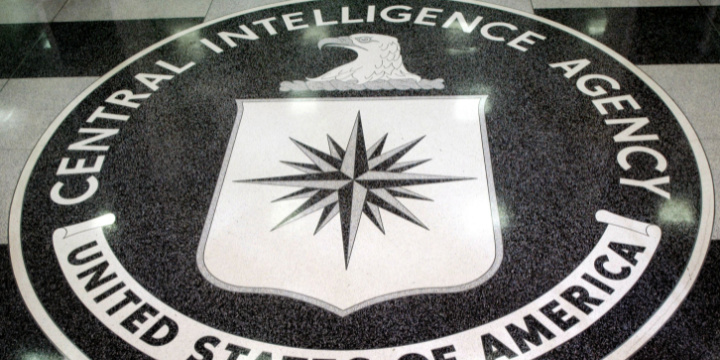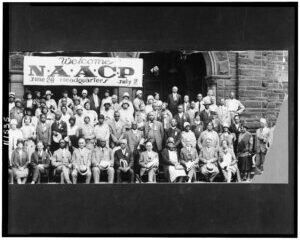“Teddy Roosevelt’s great-great-great grandson is an anti-Israel protester at Princeton,” blared a New York Post headline on May 4, 2024.
The Post reported that Quentin Colon Roosevelt, an 18-year-old freshman, and descendant of the 25th President, is an anti-Israel activist at the Ivy League university. But far from being hip and new, Quentin’s brand of anti-Zionism is old hat — he is merely continuing a long family tradition of anti-Israel activism.
There is an abundance of literature on Franklin D. Roosevelt’s views on Jews and Zionism, the belief in Jewish self-determination. Both FDR and his wife Eleanor had made antisemitic remarks. In a private conversation in 1938, then-President Roosevelt suggested that by dominating the economy in Poland, Jews were themselves fueling antisemitism. And in a 1941 Cabinet meeting, FDR remarked that there were too many Jewish Federal employees in Oregon. In his final days, FDR promised Saudi leader Abdul Aziz Ibn al Saud that he would oppose the creation of Jewish state in the Jewish people’s ancestral homeland.
FDR is the president who led the United States to victory against Adolf Hitler. He also employed Jews in high-ranking positions in his government. But he is also the president whose administration failed to save more Jews fleeing Nazism, and who refused to bomb the railway tracks leading to Auschwitz and other death camps where millions of Jews met a ghastly end. Accordingly, it makes sense that his beliefs regarding Jews have been the subject of books and belated study.
Less examined, however, is the Oyster Bay branch of the Roosevelt clan, and their beliefs regarding Zionism. In part, this is easily explained by the unique place that FDR holds in American history. He is the only president to serve four terms, and presided over both the Great Depression, World War II, and arguably the beginning of the Cold War. His branch of the family, the Hyde Park Roosevelts, were Democrats and remained active in public life for decades after his 1945 death.
At first glance, the Oyster Bay Roosevelts were more of a turn of the 19th century affair. They were Republicans, and their scion was Teddy Roosevelt, a war hero turned governor of New York state who, thanks to an assassin’s bullet, found himself as the nation’s leader in 1901.
The famously ebullient Roosevelt helped redefine the country’s idea of a president, and served as an inspiration for his cousin Franklin. But Teddy largely presided over an era of peace and tranquility, not war and upheaval.
Teddy was a philosemite. He was the first occupant of the Oval Office to appoint a Jewish American to the Cabinet. He championed the rights of Jews, both at home and abroad, and was harshly critical of the numerous pogroms that unfolded in czarist Russia.
As Seth Rogovoy has noted, Roosevelt’s “special relationship with Jews was forged during his time serving as police commissioner in New York City, a post he assumed in 1904.” When an antisemitic German preacher named Hermann Ahlwardt gave speeches in the city, Roosevelt assigned a contingent of Jewish police officers to guard the man.
Roosevelt was also a Zionist. In 1918, shortly after the Balfour Declaration, he wrote: “It seems to me that it is entirely proper to start a Zionist state around Jerusalem.” He told Lioubomir Michailovitch, the Serbian Minister to the United States, that “there can be no peace worth having … unless the Jews [are] given control of Palestine.” Six months later Roosevelt died in his sleep.
Not all his descendants would share his belief in Jewish self-determination, however.
Two of Teddy Roosevelt’s grandchildren, Kermit and Archie, served their country in the CIA during the early years of the Cold War. Both were keenly interested in Middle East affairs, and were fluent in Arabic. Both were well read and highly educated, authoring books and filing dispatches for newspapers like the Saturday Evening Post, among others.
They were also prominent anti-Zionists.
Kermit Roosevelt, known as “Kim,” played a key role in anti-Zionist efforts in the United States and abroad. He was not, by the standards of his time, an antisemite. But he was ardently opposed to the creation of Israel.
As Hugh Wilford observed in his 2013 book America’s Great Game: The CIA’s Secret Arabists and the Shaping of the Modern Middle East: “the anti-Zionism of the overt Cold War foreign policy establishment is well known” but “less widely appreciated is the opposition to Jewish statehood of the individuals responsible for setting up the United States’ covert apparatus in the Middle East.”
This began with the OSS, the CIA’s precursor. And it included men like Stephen Penrose, a former American University of Beirut instructor, and Kim Roosevelt’s boss during his wartime service in the OSS.
“Documents among Penrose’s personal papers reveal him engaged in a variety of anti-Zionist activities at the same time that he was commencing his official duties with the OSS,” Wilford notes.
Like many of his fellow Arabists, Penrose was the son of American missionaries who, failing to convert the native population to Christianity, sought to foster Arab nationalism instead. Penrose described himself as a “chief cook” who was “brewing” opposition to Zionism. He became one of Kim Roosevelt’s mentors.
In a January 1948 Middle East Journal article entitled, “Partition of Palestine: A Lesson in Pressure Politics,” Kim called the 1947 UN vote in favor of a Jewish state an “instructive and disturbing story.”
Roosevelt believed that the US media was unduly supportive of the creation of Israel, and claimed that almost all Americans “with diplomatic, educational, missionary, or business experience in the Middle East” opposed Zionism.
Kim’s pamphlet was reprinted by the Institute for Arab American Affairs, a New York-based group whose board he sat on. He also began working with the Arab League’s Washington, D.C., office and “turned elsewhere for allies in the anti-Zionist struggle, starting with the Protestant missionaries, educators, and aid workers.”
This nascent group soon received financial support from the American oil industry, which maintained close links to Kim’s OSS/CIA colleague, William Eddy.
As Wilford noted, the Arabian consortium ARAMCO “launched a public relations campaign intended to bring American opinion around to the Arab point of view.”
In addition to missionaries and big oil, Kim gained another important ally in the form of Elmer Berger, a rabbi from Flint, Michigan. Berger served as executive director of the American Council for Judaism, an anti-Zionist group that, among other things, opposed the creation of a Jewish army during World War II at the height of the Holocaust. Berger and Roosevelt became drinking buddies and close collaborators on their joint effort against the Jewish State.
Kim eventually became “organizing secretary” for a group called The Committee for Justice and Peace. The committee’s original chair, Virginia Gildersleeve, was both a longtime friend of the Roosevelts of Oyster Bay and the dean of New York City’s Barnard College, which today is part of Columbia.
Gildersleeve was “also a high-profile anti-Zionist” who “became involved with the Arab cause through her association with the Arabist philanthropist Charles Crane and the historian of Arab nationalism George Antonius.”
Crane, a wealthy and notorious antisemite, had lobbied against the creation of a Jewish state since the beginning of the 20th century, even advising then-President Woodrow Wilson against supporting the Balfour Declaration.
By 1950, the Committee had managed to recruit famed journalist Dorothy Thompson to their cause. Thompson was reportedly the basis for actress Katharine Hepburn’s character in the 1942 movie Woman of the Year. A convert to anti-Zionism, Thompson’s extensive network of reporters and celebrities proved crucial to Kim and Berger’s efforts to rally opposition to the Jewish State. In a 1951 letter to Barnard College’s Gildersleeve, Thompson wrote: “I am seriously concerned about the position of the Jews in the United States.” People, she claimed, “are beginning to ask themselves the question: who is really running America?”
Another ally emerged that year: the Central Intelligence Agency.
The CIA began funding the Committee, as well as its successor, the American Friends of the Middle East (AFME). Beginning in June 1950, Kim’s correspondence with Berger began making veiled references to the ACJ head taking on “official work” in Washington. This, Wilford believes, is a reference to working with the CIA. Indeed, the well-connected Kim and Archie Roosevelt had known top CIA officials like Allan Dulles since childhood.
With support from figures like Eddy, AFME also began encouraging Muslim-Christian alliances — ostensibly to counter Soviet influence, but also to attack the Jewish state. This led to some awkward alliances, including with Amin al-Husseini, the founding father of Palestinian nationalism and an infamous Nazi collaborator.
Husseini had ordered the murders of rival Palestinians, incited violence against Jews since the 1920s, and had led forces, equipped with Nazi-supplied arms, to destroy Israel at its rebirth in 1948. Now, along with the Secretary General of the Arab League, and Saudi King Ibn Saud, he was meeting with Eddy to discuss a “moral alliance” between Christians and Muslims to defeat communism. Kim himself knew Husseini, having interviewed him for the Saturday Evening Post after World War II.
AFME lobbied for the appointment of anti-Zionist diplomats and in favor of Eisenhower administration efforts to withhold aid from Israel. And both Berger and Thompson pushed for favorable coverage of the new Egyptian dictator, Gamal Nassar, who would wage war on the Jewish state for nearly two decades. Initially, they were successful, with TIME magazine writing that Nasser had the “lithe grace of a big, handsome, all-American quarterback.” Of course, there was nothing “all-American” about Nasser, who would become a Soviet stooge.
AFME officials like Garland Evans Hopkins would draw rebukes after claiming that Jews were bringing violence against themselves — a staple of antisemitism. Hopkins claimed that Zionists “could produce a wave of antisemitism in this country” if they continued acting against “America’s best interests in the Middle East.”
AFME itself would eventually lose influence, particularly after its boosting of figures like Nasser was revealed as foolhardy. Berger would go on to advise Senator J. William Fulbright (D-AR) in his efforts to get pro-Israel Americans to register as foreign agents.
In 1967, as Arab forces gathered to annihilate Israel, Berger blamed the Jewish State, accusing it of “aggression” and its supporters of “hysteria.” Top ACJ officials resigned in protest. That same year, Ramparts magazine exposed CIA support, financial and otherwise, of AFME.
Kim and Archie Roosevelt, however, would continue their careers as high-ranking CIA officers before eventually starting a consulting business and making use of their extensive Middle East contacts.
For some college protesters, attacking Israel — and American support for Israel — might seem new and trendy. Yet, both the CIA and big oil were precisely doing that, decades ago, forming alliances with anti-American dictators, antisemitic war criminals, the press, Protestant groups, academics, university administrators, and fringe Jewish groups claiming to represent “what’s best” for American Jewry.
As William Faulkner once wrote: “The past is never dead. It’s not even past.”
The writer is a Senior Research Analyst for CAMERA, the 65,000-member, Boston-based Committee for Accuracy in Middle East Reporting and Analysis
The post Hating Israel Isn’t New; How the CIA and State Department Undermined the Jewish State first appeared on Algemeiner.comhttps://www.algemeiner.com/.
Post Views: 2,104








